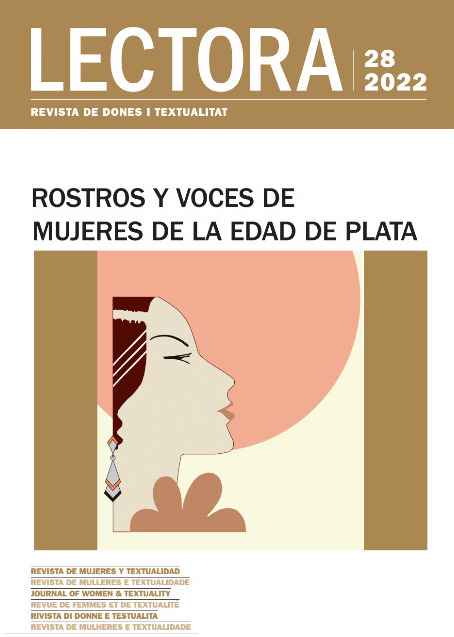Marginalidad y prostitución. Escritura abolicionista en Carlota O’Neill (1905-2000)
DOI:
https://doi.org/10.1344/Lectora2022.28.5Keywords:
Carlota O'Neill, abolitionism, movement of republican playwrights, modern women, memoirsAbstract
Carlota O’Neill de Lamo (1905-2000) was a versatile woman, like most modern women: writer, journalist, playwright, businesswoman, television and radio producer, activist... a professional career that is still unknown today, due to her imprisonment and exile. Many of her ideological positions are transmitted in her production. She was a pioneer of proletarian theater in Spain, and the theme chosen for her first play was the situation of women workers. In all her memoirs—which are not limited only to Trapped in Spain (1964)— she shows special interest in marginality and the slums. From her first play, Al rojo, in 1933, through her memoirs and other unpublished works, prostitution is one of the essential elements. Consequently, we have searched for clues in her work to answer the following question: Was Carlota O’Neill an abolitionist?
References
[Anónimo] (1924), "Mitin sanitario", La Libertad, 15/01/1924.
—(1926a), "Mitin abolicionista en el Eslava", Heraldo de Madrid, 15/03/1926: 4.
—(1926b), "El primer congreso abolicionista español", La Nación, 10/05/1926: 5.
—(1926c), "El primer congreso español de Abolicionismo", La Libertad, 14/11/1926.
—(1930), "La nueva campaña de la Sociedad española de abolicionismo", El Liberal, 25/03/1930: 3.
—(1931), "Teatro Proletario", La Voz, 23/07/1931: 4.
—(1932), "Las entidades femeninas y el abolicionismo", Luz, 08/12/1932: 8.
—(1933), "Proyección de la película Mercado de mujeres, en el acto inaugural de la campaña abolicionista en Madrid", Crónica, 22/01/1933.
—(1935), "El Cine Teatro Club", La Voz, 16/07/1935: 4.
Bobes Naves, Carmen (1997), "Los espacios dramáticos", Semiología de la obra dramática, Madrid, Arco & Libros: 387-432.
Carnés, Luisa (1934), "Una mujer busca trabajo", Estampa, 05/05/1934: 15-18.
F. M. N. (1936), "En el Lyceum Club se leyó ayer Paraíso perdido de Carlota O’Neill", El Sol, 21/03/1936: 4.
González Naranjo, Rocío (2016), "Las dramaturgas republicanas: propuesta para un movimiento literario ausente de las antologías", HispanismeS, 8: 110-128.
Juarros, César (1928), "Comentarios de un médico", La Libertad, 01/03/1928. León, María Teresa (1970), Memoria de la melancolía, Buenos Aires, Losada.
Muñoz, Matilde (1929), "Cómo nacieron las mujeres del arte. Romero de Torres cuenta la historia dramática de Carmen", Estampa, 31/12/1929: 34-35.
Mangini, Shirley (2001), Las modernas de Madrid. Las grandes intelectuales españolas de la Vanguardia, Barcelona, Península.
O’Neill, Carlota (1939), Sinfonía incompleta [inédito. Archivos personales Carlota Leret O’Neill].
—(1964), Una mexicana en la guerra de España, México D. F., La Prensa.
—(1997), Circe y los cerdos. Cómo fue España encadenada. Los que no pudieron huir, Juan Antonio Hormigón (ed.), Madrid, Asociación de Directores de Escena de España.
—(2019), Las olvidadas (Anagnórisis), Rocío González Naranjo (ed.), Madrid, Cuadernos del Vigía.
—(2021), Al rojo. El paraíso perdido. Paraíso recobrado, Rocío González Naranjo (ed.), Madrid, Torremozas.
Sánchez Covisa, José (1933), "El problema del abolicionismo en España", Cultura Integral y Femenina, 15/02/1933: 16-17.
Downloads
Published
How to Cite
Issue
Section
License
The Author retains ownership of the copyright in this article and grants Lectora: revista de dones i textualitat the rights to print publication of the Article. The work will be available under a Creative Commons Attribution-Noncommercial-No Derivative Works license, by which the article must be credited to the Author and the Journal be credited as first place of publication.
The Author is free to enter in seperate, additional contractual agreements for the non-exclusive distribution of the work as published in this journal (such as institutional repositories or a book), as long as the original publication in Lectora is credited.
The Author is encouraged to post the work online (eg in institutional or thematic repositories, or in their website), as it can lead to productive exchanges as well as to a greater citation of the published work (see The Effect of Open Access).



